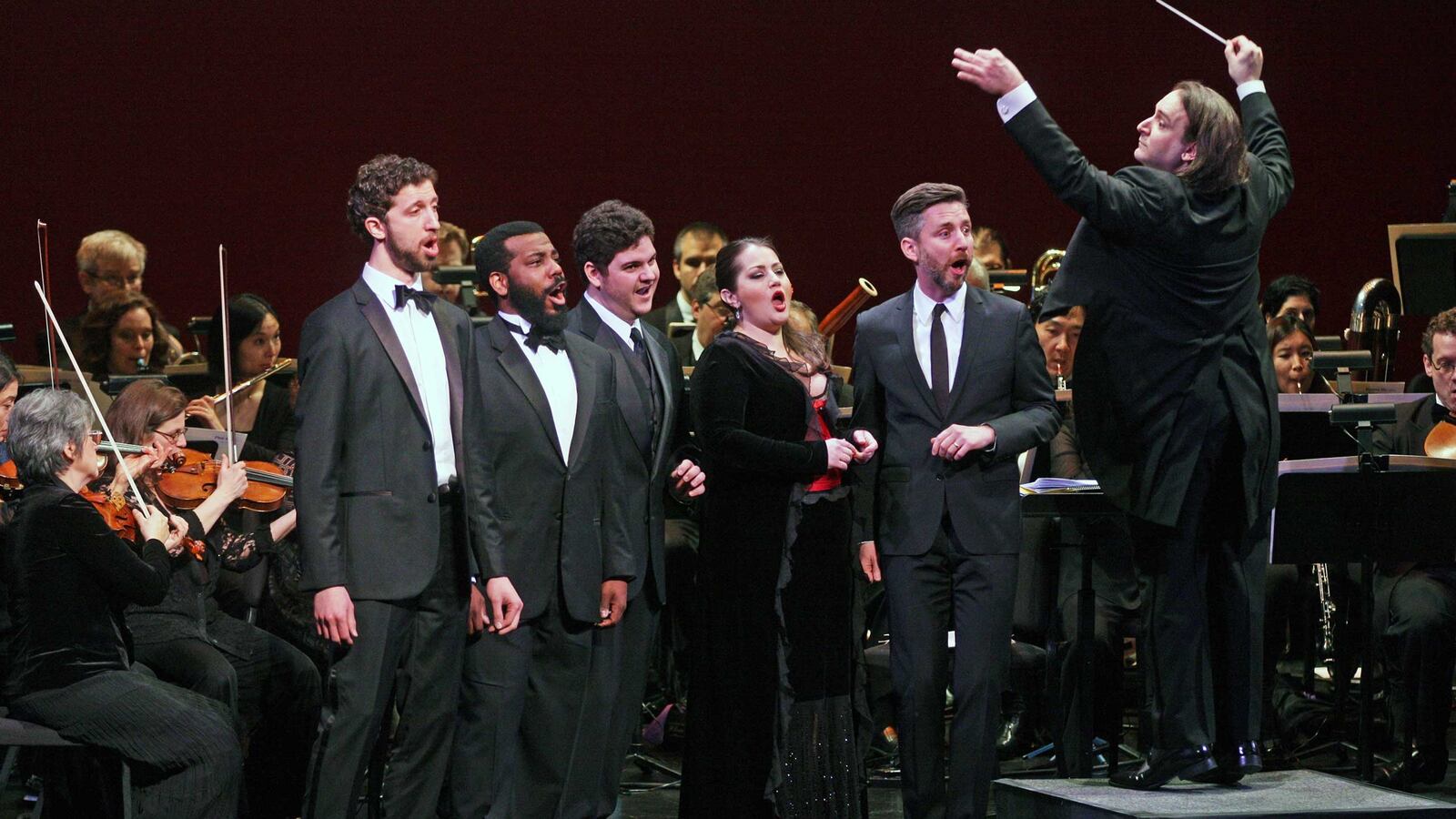The attempted resurrection of the bankrupt New York City Opera (NYCO) continued to lurch forward with the first New York City Opera Renaissance (NYCO-R) concert on Monday, March 9th at Jazz in Lincoln Center’s Rose Theatre.
With all the drama and intrigue surrounding the attempts at reviving NYCO, I’m not sure what I was expecting from the concert. Honestly some part of me feared onstage fistfights. That may seem ludicrous but with the amount of venom and passion this fight has engendered actual physical violence did not seem outside the realm of possibility.
The absurd backstory of the battle to resurrect NYCO has been described here and here.
But there has been much more since then.
The NYCO-R concert was originally billed as a tribute to Julius Rudel. Rudel was a world famous conductor who spent 22 years (1957-79) as principal conductor and director of New York City Opera and was pivotal in making it a world class opera house. He died in June of 2014 at age 93.
NYCO-R’s announcement of the March 9th Rudel tribute concert early last December was at first met with great enthusiasm. Rudel was a greatly admired and beloved figure in classical music and opera, helping start the careers of many opera legends.
The original concert press release opened with “NYCO Renaissance Ltd. has partnered with the Rudel family to celebrate the illustrious career of Maestro Julius Rudel and his invaluable contribution to the New York City Opera as principal conductor and director for 22 years from 1957 to 1979.”
But that first rush of widespread enthusiasm was short lived as the tribute concert developed into a fundraiser for the controversial NYCO-R.
The verbiage surrounding the concert evolved quickly and fluidly as well. It was alternately referred to in Facebook postings as “Gala Concert and Dinner Celebrating the Life of Late Maestro Julius Rudel” or simply the “NYCO Renaissance Opening Gala”. NYCO-R’s own twitter feed called it the “#NewNYCO Gala”. Photos in the ads also shifted from Julius Rudel to Placido Domingo and finally to Sting, who was originally scheduled to perform but canceled last minute.
By mid-February, the main tag for the gala ads became “The People’s Opera Returns with a Gala Concert and Dinner Celebrating Julius Rudel.”
Even NYCO-R’s own twitter feed alternated between thanking the scheduled performers for lending their voices “to celebrate Maestro Rudel’s legacy” and for “helping bring in a new era of opera at the NYCO Renaissance Gala.”
Some felt there had been a bait and switch: was the concert a tribute/memorial to Rudel or an Opening Night Gala and launch party for NYCO-R? Many singers committed to the evening due to their loyalty to Rudel and wanting to pay tribute to him, not necessarily to support NYCO-R.
NYCO-R President, Roy Niederhoffer, and its General Manger, Michael Capasso, became the flashpoint for a great deal of the criticism and ill will, some of it predating the concert announcement, but the concert served as a rallying point for their critics, many of them ex-New York City Opera alums. Vitriol blazed across Facebook opera circles.
Additionally, the idea of an opening night gala seemed bizarre as the court case surrounding the sale of the New York City Opera name is still unresolved with NYCO-R, the presumptive front runner, and a group led by architect Gene Kaufman awaiting a bankruptcy court determination.
Adding fuel to the fire, as usual, was Alan Gordon, the National Executive Director of American Guild of Musical Artists which represents opera soloists and choristers. In early February, Gordon sent a letter to the principal singers scheduled for the NYCO-R benefit, including Placido Domingo, condemning the concert.
It was Gordon who originally called NYCO-R “an imaginative but grossly underfunded pipe dream, an unrealizable fantasy that will frustrate the hopes of opera lovers.”
Last year, during the Metropolitan Opera union negotiations, Gordon also engaged in an often vicious war of words across social media with Met General Manager Peter Gelb.
On Monday March 9th, the day of the NYCO-R concert, Gordon pre-emptively threatened Chicago’s Lyric Opera with a strike over negotiations that are still nearly 2 months away.
Gordon’s letter of early February to the NYCO-R concert principal singers, which was later sent to all members of AGMA and posted to Facebook, opened with, “In our opinion, each of you has been subjected to a significant misrepresentation. “
It continued, “The March 9th concert has little whatsoever to do with Rudel’s legacy or our admiration for Julius. Rather, in fact, what this concert is really intended to do is to raise money for Roy Neiderhoffer’s (sic) current hobby: Trying to be a player in the opera business under the imaginative but misleading name NYCO-Renaissance or NYCO-R.”
And finally in full screaming bold, “Avoid someone trying to use you as a pawn in a money making scheme for Neiderhoffer’s would-be NYCO-R.”
The repeated misspellings of Niederhoffer’s name are Gordon’s own.
NYCO-R countered almost immediately to Gordon’s letter and addressed claims of a bait and switch. They provided a personal letter from Tony Rudel, Julius Rudel’s son, to the principal singers involved which stated in part:
“The fact is March 9th IS all about Julius and his legacy. You are each testament to that, and I would have never agreed to this gala if that had not been the case.
“Months before Julius died, the Niederhoffer plan was presented to me, and I then presented it to Julius… During the final months of his life, Julius repeatedly discussed the plan with me and made it very clear that he hoped the New York City Opera would be revived.
“So, when the chance to link a tribute to Julius with NYCO-R’s attempt to revive the company he so loved presented itself, my sisters and I decided that this is exactly what our father would have wanted.”
The day after the concert Niederhoffer posted a lengthy response to his own Facebook page calling Gordon’s letter, “highly disrespectful and frankly, disgusting dishonor to Maestro Rudel, his family, and to everyone who loves New York City Opera.”
It appears that Gordon has not yet officially responded to Niederhoffer’s latest letter, though the Facebook comments are flying in every direction. And given precedent, it’s certain Gordon will have a great deal more to say.
For all the offstage drama, the pre-concert reception and event itself were far less dramatic than I expected. No fistfights or yelling or tension or even arguing that I could see. What I did see that was interesting was almost no one I recognized from the Metropolitan Opera scene--many younger faces who I’m not sure will be repeat visitors. But maybe just getting young people into the theatre is enough. If even 10% of them get the opera bug good things could happen for NYCO-R and opera in general.
The sold out concert itself was fine, with some lovely singing and conducting by veteran professionals, though organizationally it was in need of a polish and would have greatly benefitted from an announcement of each piece. A world premiere piece by composer Tobias Picker, for example, went completely unremarked upon.
During their mid-concert comments, Niederhoffer and Capasso announced the Gala and dinner had raised $800K for the company.
An impressive amount, but as veteran New York Times über critic Anthony Tommasini put it when remarking upon the evening, “Mr. Capasso even spoke of a City Opera season this fall, with productions presented in the Rose Theater. Those involved with this venture may be getting ahead of themselves.”
Notwithstanding all the young new faces in the audience, he may be correct. For now.





